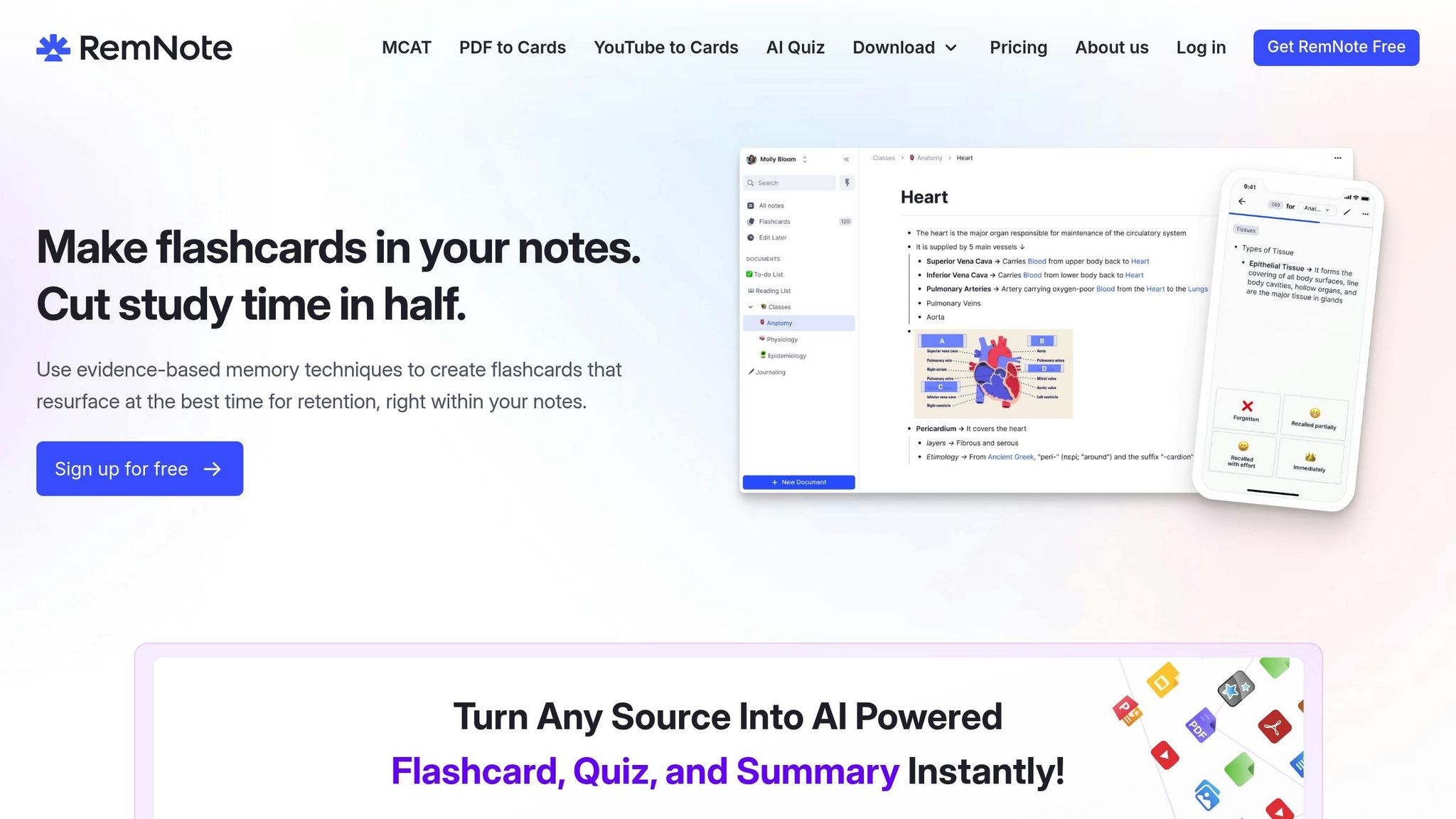
How AI Optimizes Flashcards for Spaced Repetition
Want to study faster and remember more? AI-powered flashcards use spaced repetition to improve memory retention by 200–300% compared to traditional methods. Tools like QuizCat AI create flashcards from your study materials, schedule reviews at the right times, and adjust difficulty based on your performance. Here’s how they help:
- Save Time: Automatically generate flashcards and reduce study time by 30–50%.
- Boost Retention: Personalized review schedules ensure you don’t forget key concepts.
- Track Progress: Get real-time feedback, monitor success rates, and focus on weak areas.
- Adapt to Your Needs: Adjust difficulty and break down complex topics for easier learning.
AI makes studying more efficient and engaging by tailoring the process to fit your learning habits. Ready to transform your study sessions? Keep reading to learn how it works.
How AI Creates Flashcards
Text Analysis with NLP
Today’s NLP systems use cutting-edge machine learning and statistical techniques to understand the context and meaning of text. Advanced algorithms identify key concepts and map out how they relate to one another. For example, QuizCat AI’s NLP engine analyzes uploaded study materials by breaking down academic content into essential components. This ensures the flashcards reflect meaningful connections that help users better grasp the material.
Converting Text to Flashcards
Machine learning algorithms play a crucial role in shaping the question-and-answer format for each concept. This process involves:
- Pinpointing the main ideas and organizing them to encourage active recall.
- Crafting clear, focused questions aligned with specific learning goals.
- Producing detailed answers that strengthen understanding.
The AI carefully balances the information on each flashcard - avoiding content that’s too sparse or overwhelming. This balance is critical for effective spaced repetition, a proven method for improving retention.
Quality Control Methods
AI-driven quality checks ensure that every flashcard meets high standards. These automated systems verify the accuracy of the content, check grammar and syntax, ensure logical flow between questions and answers, and adjust difficulty levels to suit the material. While there’s minimal human oversight, the AI consistently delivers reliable and well-structured flashcards. This rigorous process lays the groundwork for personalized learning features that make review sessions even more effective.
Smart Learning Features
Review Timing System
QuizCat AI takes the guesswork out of scheduling your study sessions by using data-driven insights to determine the best times to review flashcards. If you're consistently nailing your answers, it gradually increases the gap between review sessions - from a few hours to several days or even weeks. This approach helps your brain shift information from short-term to long-term memory more effectively.
Here’s what it considers:
- Your past success rates with similar material
- The complexity of the content you're studying
- Times when you're most alert and perform best
This smart timing system works hand-in-hand with adjustments to difficulty, ensuring every review session is as effective as possible.
Difficulty Adjustment
Struggling with a tough subject? The AI has your back. QuizCat adjusts the difficulty of flashcards based on your performance. If you're having trouble with advanced topics, it breaks them down into smaller, easier-to-digest pieces. For example, if calculus derivatives are tripping you up, the system might first focus on foundational concepts like limits and slopes before introducing more challenging problems.
How it works:
- Tracks your response time, accuracy, and areas of struggle
- Simplifies or intensifies questions based on your progress
- Offers tailored hints and answer options
- Builds step-by-step learning paths to help you master complex topics
This ensures you're always working at the right level - challenged but not overwhelmed.
Performance Monitoring
QuizCat AI doesn’t just track your progress - it uses that data to optimize your learning experience. By analyzing key metrics, the system fine-tunes your study plan to focus on what matters most.
| Metric | Purpose | What It Does |
|---|---|---|
| Response Time | Measures how quickly you recall info | Adjusts how often you review content |
| Error Patterns | Spots recurring mistakes | Creates targeted practice sets |
| Success Rate | Tracks how well you’re mastering topics | Modifies difficulty levels |
| Study Sessions | Identifies your most productive times | Suggests peak study periods |
For instance, if the AI notices you’re consistently making errors in a specific area, it’ll generate extra practice sets to help you improve. And if your performance peaks in the morning, it’ll recommend scheduling your toughest reviews during that time. This personalized approach ensures you’re spending more energy on what you need to improve, while breezing through material you already know well.
Using Remnote to Crush Exams: AI Textbook-to-Flashcard Magic!

sbb-itb-1e479da
Results of AI Flashcards
AI-powered flashcards are changing the way we study by making sessions more efficient, improving memory retention, and creating a more interactive learning experience. By combining advanced flashcard creation with tailored review features, these tools deliver real, measurable benefits.
Faster Study Sessions
According to research from the University of California, AI flashcards can reduce study time by 30–50%. Tools like QuizCat AI take the hassle out of studying by instantly converting materials into flashcards, zeroing in on weak areas, skipping over content you've already mastered, and scheduling reviews at just the right time.
Better Memory Results
Did you know that without reinforcement, 70% of new information is forgotten within 24 hours, and 90% is lost after a week? That’s what research from the University of Waterloo reveals. But here’s the good news: UCLA studies show that AI-optimized spaced repetition can improve retention by 200–300% compared to traditional study sessions.
QuizCat AI takes this a step further by personalizing review schedules based on your learning habits. It tracks your progress and adjusts review intervals to ensure you don’t forget what you’ve learned. This approach doesn’t just improve retention - it makes studying more engaging.
More Interactive Learning
Harvard research highlights that actively retrieving information strengthens brain connections far more effectively than passive review. QuizCat AI builds on this idea, offering features that make learning dynamic and engaging:
| Feature | Benefit | Impact |
|---|---|---|
| Real-time Feedback | Understand mistakes immediately | Correct misconceptions faster |
| Progress Tracking | See your improvement visually | Stay motivated to keep going |
| Adaptive Difficulty | Get questions tailored to your level | Always face the right challenge |
| Multimedia Integration | Use visuals, audio, and more | Retain concepts more effectively |
These features not only make studying more effective but also ensure it’s a process you’ll actually enjoy.
Conclusion
AI is reshaping how we study by combining advanced flashcard creation with personalized review techniques. Research from UCLA highlights that AI-driven review timing can improve long-term memory retention by an impressive 200–300% compared to traditional study methods.
Unlike static study materials, AI-powered flashcards adapt to your learning needs. By analyzing your performance and adjusting review intervals, these tools ensure that you focus on the right material at the right time. This tailored approach, paired with real-time feedback and progress tracking, makes studying not only more effective but also more engaging.
For example, QuizCat AI takes your study materials and transforms them into interactive flashcards, quizzes, and even podcasts. Want to see the difference for yourself? Try it out with a $0.99 trial for a week and potentially cut your study time by 30–50% while boosting retention.
FAQs
How does AI decide the best time to review flashcards for better memory retention?
AI takes the guesswork out of reviewing flashcards by studying your learning habits and performance. Through spaced repetition techniques, it identifies when you're on the verge of forgetting a concept and schedules reviews at just the right time. This way, the material stays fresh in your mind without unnecessary repetition.
As you progress, AI adjusts the timing of reviews to suit your specific needs. You'll spend less time revisiting concepts you've already nailed and more time focusing on areas that require extra attention. The result? Study sessions that are both productive and tailored to you.
How does AI adjust flashcard difficulty based on my progress, and why is this helpful for learning?
AI adjusts flashcard difficulty based on how you perform - tracking how quickly and accurately you respond. If you’re nailing the answers, it steps things up by introducing tougher questions or scaling back hints to push your understanding further. On the flip side, if you’re finding it tough, it simplifies the material or provides extra help to get you back on track.
This tailored method keeps your study sessions both engaging and effective. By hitting the sweet spot of challenge, it improves retention, avoids unnecessary frustration, and helps you make the most of your learning time.
How does AI improve the quality and effectiveness of flashcards for learning?
AI improves the quality and usefulness of flashcards by using natural language processing (NLP) to analyze and fine-tune the content, ensuring it's clear and precise. It also employs machine learning algorithms to customize flashcards based on each learner's unique needs, adjusting as they progress and identifying areas that need extra attention.
With the help of spaced repetition, AI determines the best times for review sessions to maximize memory retention over time. By blending active recall techniques with these personalized adjustments, AI-driven flashcards allow learners to focus on tougher topics while reinforcing concepts they've already mastered.
